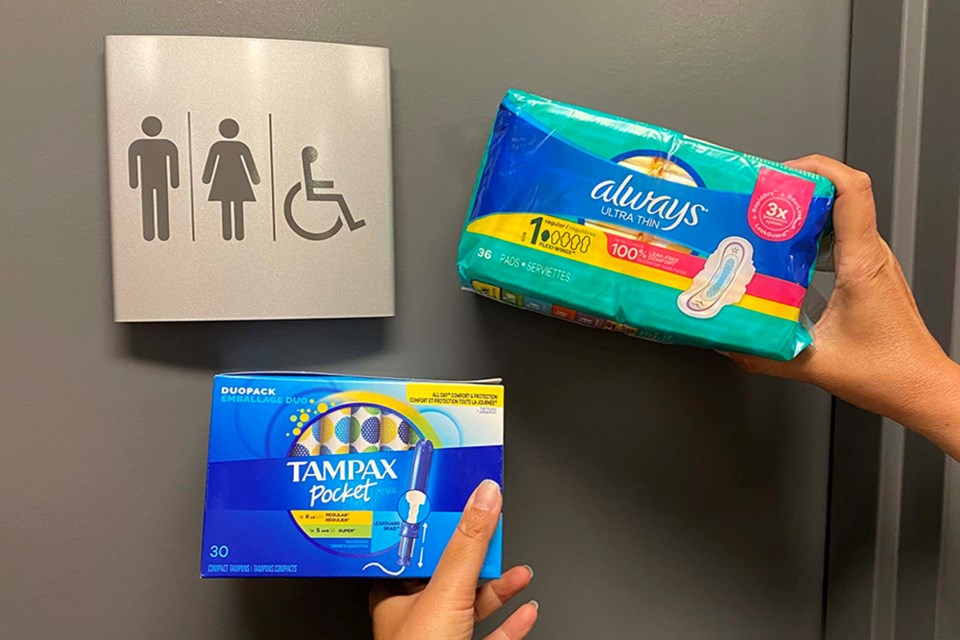A St. Albert school division is helping to remove the stigma surrounding menstruation.
Schools throughout the Greater St. Albert Catholic School Division will soon be offering students free menstrual products in washrooms as a part of an initiative to remove barriers for those who menstruate.
“I think that's what it really comes down to just making women feel comfortable in the environment that they're in. I mean, I can compare it to getting a band-aid or having access to a paper towel or toilet paper, like it really is just a human right,” said Leisa Michael, a teacher at Bertha Kennedy and project lead for the initiative.
Michael said they want to make sure the learning environment is accessible for all students. One way is by offering period products and disposal bins in all bathrooms.
Dispensers and disposable bins will be installed throughout December and January. Michael is hoping installation will be completed by this spring.
“We just wanted to make sure that girls had access to the disposal bins for privacy in both gender and gender-neutral bathrooms. So, in every bathroom, and we wanted to make sure that we were removing the barrier of having the menstruators ask for products,” she said.
Michael said many of the schools in the school division have been offering students free products at the office, but a student would have to ask.
“We wanted to remove the barrier of having them ask,” she said.
Michael, who is also the Women in Leadership chair for the local Alberta Teachers' Association, said they had a Women in Leadership event early in the year that inspired many teachers in the division.
“About nine months ago, we had a Woman in Leadership event, which was a screening of a movie called Pandora's Box. It's a documentary about the global pandemic of menstrual inequality and period poverty,” she said.
After the screening, Michael said “a lot of the teachers” started to think about ways they could minimize menstrual inequality in their own schools.
“We went to the board of trustees in our division, got support from there, and then a committee was formed just really trying to figure out how we can remove the barrier and have access to free products actually in the bathroom,” she said.
Michael said the project has a budget of around $9,000 for disposal and dispenser bins and $1,800 per year per school; however, some of the schools are receiving donations from grocery stores and parent councils.
“Any time that we can remove the barrier and provide access to menstrual hygiene products, we know that schools are really an environment for learning and when we can provide those products and any access for girls and more access to the learning, the better. We want to foster inclusive learning environments and promote equity,” said Michael.
Back in October, the province announced it would be investing $260,000 to the Period Promise pilot project, a United Way Initiative that will also provide free menstrual products to youth in 50 schools with the most vulnerable populations.
“Funding from the government will go towards installing period product dispensers in bathrooms and toward an educational campaign. The campaign’s goal is to destigmatize women’s health issues, including periods, in schools, workplaces and community organizations,” said a press release about the project.
Carrie-Ann Lunde, media relations for the United Way, said the long-term vision for Period Promise is to have menstrual products “available in all facilities, schools, and workplaces so that it's never making people having to choose between buying food or buying products.”
Lunde said according to the data the United Way has gathered from Statistics Canada, almost a quarter of people who menstruate in Canada say they cannot afford products for themselves or their children.
“There's also significant data that shows when people don't have access to menstrual products, they miss school work or other opportunities to really participate in community,” she said.
Lunde said the average person spends on average around $5,500 on period products, not including the cost for pain products, laundry, and other supplies.
People in vulnerable situations who can’t afford products, don’t have access to be able to clean products, or who are using a product for too long can face health risks.
“This is a reality for people in vulnerable situations, that's what we're trying to address,” she said.
Lunde said the United Way is using a “multi-pronged approach” in terms of working with government and businesses to get products in schools and into workplaces, so there are multiple access points.
“It really does take multiple levels of government and community agencies and businesses to be able to really make that level of change,” she said.
The stigma of menstruation is itself complex, said Lunde.
“(The stigma) can be subtle and be dependent on different ethnic or cultural backgrounds … trying to normalize access to menstrual products can really help break that taboo so it's not something you're having to hide up your sleeve as you're going to the washroom, but that it's available in the washroom.”




